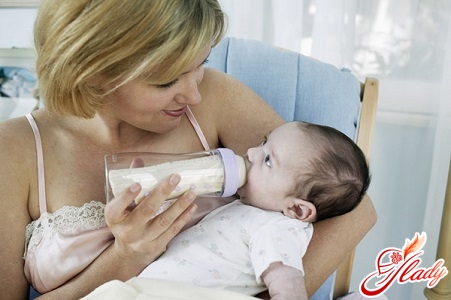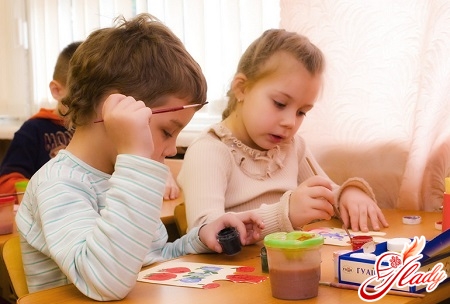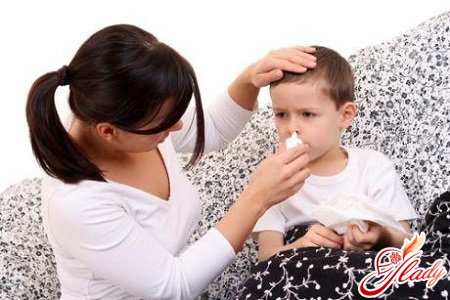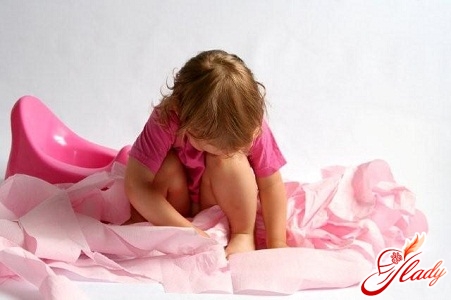 Children's well-being is the main concernall parents without exception. And small children very often give parents a reason to worry - either a sore throat, or a runny nose, or even: diarrhea or vomiting will begin. And the mother needs to know how to provide first aid to her child before the doctor arrives. However, in order for the mother to be able to provide the child with the necessary assistance, she must know what could have provoked the appearance of diarrhea or vomiting. And assistance must also be provided competently - otherwise the child's condition may significantly worsen. This is what will be discussed in this article - vomiting in a child without fever and diarrhea, just diarrhea, or all the symptoms accompanied by an increase in body temperature.
Children's well-being is the main concernall parents without exception. And small children very often give parents a reason to worry - either a sore throat, or a runny nose, or even: diarrhea or vomiting will begin. And the mother needs to know how to provide first aid to her child before the doctor arrives. However, in order for the mother to be able to provide the child with the necessary assistance, she must know what could have provoked the appearance of diarrhea or vomiting. And assistance must also be provided competently - otherwise the child's condition may significantly worsen. This is what will be discussed in this article - vomiting in a child without fever and diarrhea, just diarrhea, or all the symptoms accompanied by an increase in body temperature.
Features of diarrhea in a child
There are a huge number of the mostvarious factors that can lead to the development of diarrhea in a child. These include intestinal infections, food poisoning, helminthic invasion or lactose deficiency, stress, taking certain medications, etc. Stool during diarrhea in a child can also vary in color and smell, as well as consistency. These indicators depend on what exactly caused the intestinal disorder. A child's stool can be either liquid, almost watery, or mushy, brown or greenish, and in rare cases - even white. The stool can be very greasy, shiny, with pieces of undigested food. The smell of stool can also vary significantly - from no smell at all to sour or even rotten. Based on the consistency of the child's stool, an experienced doctor can with a high degree of probability assume what exactly caused the disease. For example, if a child suffers from a rotavirus infection, his stool is usually foamy, it can be colored in different colors - in case of amoebic dysentery it is the color of raspberry jelly, in case of salmonellosis - the color of swamp mud, in case of hepatitis - even white. However, of course, no doctor will diagnose the disease only on the basis of the color and smell of the stool - he will conduct all the necessary examination. The absence or presence of vomiting and fever in the child plays an important role - these indicators are also taken into account when making a diagnosis. Children under one year of age especially often suffer from diarrhea. And there are several objective explanations for this phenomenon that parents must take into account:
- Violation of personal hygiene and sanitary norms
The most common cause of diarrhea ininfants is the elementary neglect of sanitary norms by parents. Poorly washed hands, dirty nipples or bottles, dirty rattles - all this can cause a gastrointestinal infection.
- Diet
It is very important to carefully monitor your baby's diet.The slightest error - the wrong quality, composition or quantity of food can lead to the development of an intestinal disorder. In addition, the peculiarity of the child's digestive system is such that any changes in the diet can provoke an intestinal disorder.
- Sharp change of climatic zone
Even adults experience a sudden change in climatetolerates very difficult. And what can we say about very small children. Therefore, the doctor strongly advises against planning trips with the child to other climatic zones during the first two years of the child's life. Well, and if this trip is simply necessary, parents should buy antidiarrheal pharmacological drugs. For children, diarrhea is terrible due to such a complication as dehydration. Moreover, the younger the child, the more terrible dehydration is for him. The main signs of dehydration are:
- Increased thirst
If the body is dehydrated, the child mayexperience a strong feeling of thirst. In a small child who cannot ask for a drink, the main indicator is the baby's dry lips - they may even crack. However, do not rush to give the baby a drink - remember that a large amount of liquid can provoke an attack of vomiting. The child should be given liquid in small portions - about a teaspoon, but after a short period of time - about five to ten minutes. Simply put, the child needs to be given water.
- Skin change
The baby's skin becomes dry and loses its elasticity. However, parents may notice this sign only in the case of severe dehydration, which seriously threatens the baby's condition.
- Change in urination
Very important diagnostic value indehydration has a child's urination. If a child urinates less than 6 times a day, the color of the urine is dark and has a strong odor, significant dehydration can be suspected. In the presence of dehydration, small children under three years of age are shown immediate hospitalization. And diarrhea in a child under one year leads to dehydration in 70% of all cases.
Intestinal infection, food poisoning
Vomiting and diarrhea may also occur.a child with food poisoning or various intestinal infections. In such cases, diarrhea is almost always accompanied by uncontrollable vomiting, fever - sometimes to very significant levels, severe pain in the abdomen. In addition, the general condition of the child also deteriorates significantly. The baby becomes apathetic, lethargic, refuses to eat, and can sleep almost all the time. In addition, doctors have recently been increasingly faced with acute respiratory infections with diarrhea syndrome. In such cases, the child has all the symptoms that are typical for ARVI - runny nose, cough, sore throat, fever. However, in addition to all these "delights", the child develops diarrhea and vomiting. At the first signs of the disease, parents should call a doctor as soon as possible - in small children, dehydration increases rapidly, literally in a few seconds.
Dysbacteriosis of the intestine, irritable bowel syndrome
Another common reason isthe occurrence of diarrhea in a child is dysbacteriosis. Dysbacteriosis is a violation of the normal microflora in the intestine. As a rule, intestinal dysbacteriosis is almost always accompanied by the so-called irritable bowel syndrome. Dysbacteriosis is not so difficult to recognize, it has quite specific symptoms:
- Stomach ache
The child may complain of distending painsensations in the abdomen. If the baby is small and cannot complain of pain, an attentive mother will easily notice changes in the baby's behavior - he will cry, kick his legs.
- Flatulence
- Diarrhea or constipation
Another distinct featuredysbacteriosis are alternating constipation and diarrhea. Moreover, during diarrhea, the child has a very specific stool - quite liquid, with fragments of undigested food, with an extremely unpleasant odor. If such symptoms appear, you need to show the child to a doctor who will clarify the diagnosis and prescribe appropriate treatment.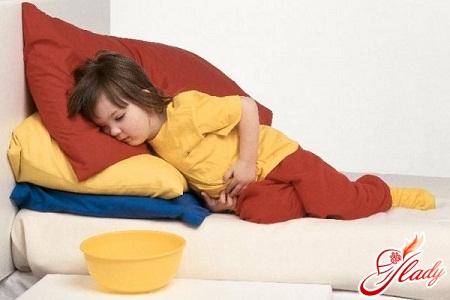
Lactose insufficiency
Also quite often the cause of occurrencediarrhea in a baby is lactose deficiency. This disorder occurs if the child's body has a reduced content or is completely absent of such an enzyme as lactose. There are several reasons for this disorder - it can be a congenital, inherited feature of the child's body, or it can be a consequence of acute intestinal infections suffered by the baby. The disorder can also be a consequence of allergic reactions to cow's milk, the result of taking a number of pharmacological drugs. Quite often, lactose deficiency in children of the first year of life is a temporary phenomenon and is caused by physiological immaturity of the intestine. As the child grows older and the intestines mature, lactose deficiency goes away on its own, without any outside intervention. In the event that lactose deficiency is congenital, its symptoms begin to appear already in the first hours of life. During each feeding, the baby has foamy liquid stools with a pronounced sour odor. In addition, the child has intestinal colic, flatulence, belching and almost constant regurgitation, weight loss exceeding the physiological norm. The main indicator of lactose deficiency in a child is the presence of carbohydrates in the feces. Treatment of lactose deficiency involves following a strict diet - complete exclusion of milk from the diet. As a rule, this measure is very effective - already on the second - fourth day, the child's diarrhea, vomiting, and intestinal colic disappear. Starting from the fifth day, the baby begins to gain weight. Remember that the transition to a lactose-free mixture should be smooth - within two to three days.
Gluten enteropathy
This disease is expressed in intolerancea child of gluten - a protein found in cereals. This disease is usually either inherited or acquired as a result of intestinal infections or helminthic invasions. As a rule, this disease makes itself known by the end of the first year of life, when complementary foods of porridge or bread are introduced into the baby's diet. The baby develops such clinical manifestations as abundant foamy stools with a sharp and very unpleasant odor, weight loss. As the disease progresses, the child develops fat, vitamin and protein deficiencies. If the disease is left unattended, it will progress - the child will have an extremely large, bloated belly against the background of severe weight loss. To treat this disease, it is necessary to exclude from the baby's diet all those dishes that contain any cereals - be it buckwheat, rice or semolina. In addition, the child will be prescribed a number of special pharmacological drugs.
Vomiting in children
And if with diarrhea everything is more or less clear, thenvomiting in children raises many more questions. Vomiting in a child can be an absolute trifle, not requiring any concern. Or it can be a signal of a serious illness requiring immediate medical intervention. Vomiting in a child is never an independent disease. It is only a symptomatic sign of some metabolic diseases, gastrointestinal tract, or a symptom of general intoxication of the child's body. The cause of vomiting in a child, in addition to those diseases in which diarrhea and vomiting occur, and which have already been discussed above, is:
- Acute appendicitis
Often the very first sign of appendicitis ininfants is precisely the appearance of vomiting. And in no case should you forget about this possibility - to great regret, but recently more and more often doctors are forced to operate on children under one year of age for acute appendicitis.
- Diseases of the central nervous system
Very often, vomiting attacks are a signal aboutexisting disorders in the functioning of the nervous system. Most often, such disorders are: asphyxia, resulting in organic damage to the central nervous system, increased intracranial pressure.
- Reception of pharmacological preparations
Sometimes vomiting is a responseof the body to take certain pharmacological drugs. As a rule, it is not so difficult to identify such vomiting - it appears within the first hour after taking the drug.
- Pylorospasm
Piroplasmosis is called spasmpylorus, which makes regular emptying of the stomach impossible. This disease is functional. It makes itself known already in the first few days of life. The baby begins to vomit after feeding. However, it is not profuse, and does not appear after every feeding. The vomit may contain streaks of bile. The baby loses weight, but not critically. Girls are susceptible to this disease much more often than boys. The doctor will prescribe normal treatment for the child.
- Pylorosthenosis
This disease is characterized by a violationevacuation of the stomach contents. This disorder is a gross defect of the pyloric section of the stomach, and is a congenital hypertrophy of the entire muscular layer of the pylorus. Unlike pylorospasm, boys are much more susceptible to this disease. The disease first makes itself known between the second and fourth weeks of the baby's life. After each feeding, the child experiences profuse gushing vomiting, and its volume significantly exceeds the volume of food eaten. Between meals, the child constantly regurgitates. The child loses weight very quickly, his skin becomes so dry that it easily gathers into small folds. The baby develops systematic constipation, and his appetite is significantly increased. In this case, parents should seek medical help as soon as possible - the treatment for this disorder of the digestive system is only surgical, and you cannot hesitate for a day.
- Acute gastritis
Babies may also face thisdisease, such as acute gastritis. In this case, the child vomits, not accompanied by diarrhea or fever. However, the child may be anxious, as he almost certainly has a stomach ache. In this case, the mother should put the child to bed, offer him something to drink and call a doctor - a pediatrician who will examine the baby and decide on further treatment tactics for the baby.
- Migraine
We have all heard about this more than onceillness, such as migraine, and perhaps you yourself periodically suffer from its attacks. But few mothers realize that a small baby can also suffer from the most severe migraine attacks. And they can also be accompanied by vomiting attacks in the baby. Only an experienced doctor - a neurologist - can make the correct diagnosis.
- Foreign body
Remember that little children havea tendency to pull everything into the mouth. And it happens that the child can swallow small objects. And if the swallowed foreign object is large enough and gets stuck in the esophagus, the child may begin to vomit intensely, caused by spasmodic contraction of the smooth muscles of the esophagus. As a rule, such vomiting occurs within a few minutes after the child has swallowed a foreign body. The child is extremely restless, may begin to cry, his breathing may also be extremely difficult, severe lacrimation may begin. The vomit contains undigested food, and if the foreign object has damaged the mucous membrane of the esophagus, streaks of blood may appear. If such symptoms appear, parents should call an ambulance as soon as possible. Strictly speaking, any vomiting attacks in infants should never be left without due attention from parents. If the child is healthy, he should not have vomiting attacks. And a tiny child cannot complain about anything, so vomiting is often the only alarming symptom. And diarrhea should never be ignored - because in almost all cases it indicates the presence of certain pathological processes in the child's body. Vomiting and diarrhea in a child are a reason to urgently consult a doctor! We recommend reading:





